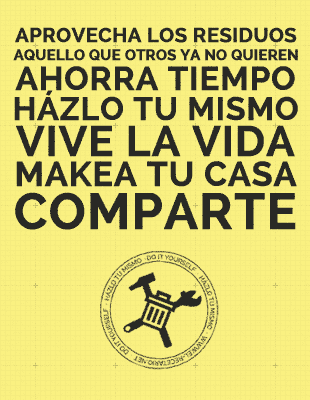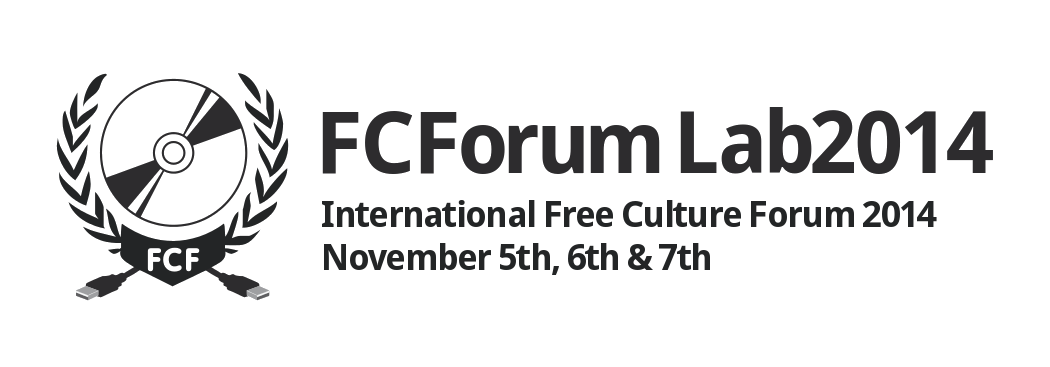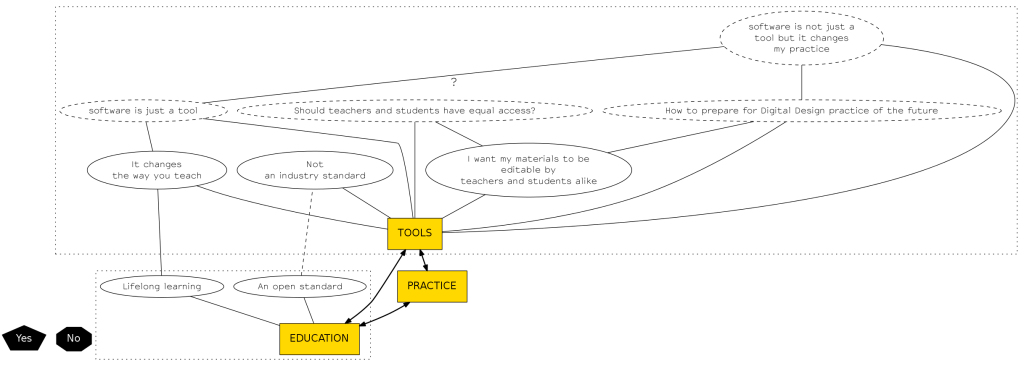“Considering your tools”
Wednesday, 5 November
from 14:00 until 18:00
In Bau, Design College of Barcelona (see the map)
Building A – Classroom A.0.6
Imparted by:
Femke Snelting & OSP (Open Source Publishing)
Description of the Workshop:
This workshop starts from our experience with using Free and Open Source software in our (graphic) design practice. We would like to share what this means for our own work, and more particularly how it has an effect on our ideas about design education. Free culture challenges traditional art-education paradigms because it invites participants to move between roles (teacher, student, developer, user) and because it necessitates a fundamental questioning of the political and cultural heritage embedded in the technologies that we employ.
Art- and design students are typically expected to create their work using proprietary tools for research, prototypes, (re)presentation and production. Sometimes, they are taught particular packages but more often the impact of software and hardware choices will be ignored. How to engage with the growing importance of digital processes in a way that relates to the intellectual and aesthetic paradigms of design-education? How to consider soft- and hardware as an integral part of design practice, and develop more intimate and experimental relations with digital tools? And what is the importance of using Free, Libre and Open Source software for all this?
Programme
What do we mean by open design practice? (45mins)
A tour through the current practice of OSP, a Brussels’ based design caravan that decided in 2006 to use Free, Libre and Open Source software only. Changing from proprietary (ie OSX and Adobe) to Free Software means not just replacing one tool by another. It means engaging in the design of those tools, rethinking the collaboration processes, and the way one distributes their work. How has Free Software changed the practice of OSP? How do they work together now? And in what way have their aesthetics changed?
Some talking points:
- Free Software tools might be designed for a different public than graphic deisgners. For scientists, activists, programmers or amateurs, for example. Using these tools means confronting paradigms different from the Graphic Design mainstream.
- The Free Software community puts a lot of emphasis and archiving and sharing their sources, choosing to release ‘source files’ early in the development process: ‘Release early, release often’. OSP follows this approach by sharing their design files online, right from the start of a project. How does this change the relation with the client/collaborator and the public?
- Within existing proprietary design tools there are not many infrastructures for collaboration. The world of Free and Open Source Software has great tools for collaboration, but they are meant for programming code. OSP tries to imagine other infrastructures that allow to design together: open ended, fluid, Read-Write exchange…
- Using non-mainstream tools often requires new expertise. Every new OSP projects mixes designing and learning. We may find ourselves programming too, even if we’re not educated programmers and may be less confident about it. How do we live this constant ‘relearn’? And how do we find the time to do so in the market of Graphic Design, where time is always in short supply?
Collaborative mapping exercise using Graphviz and Etherpad (60mins)
The starting point for this exercise are notes from preparatory meetings. While brainstorming about relevant keywords and concepts, we generate a collaborative visualisation in real time.
Graphiz is a network visualization software software developed in the early nineties by AT&T labs and mainly used in bioinformatics, machine learning and other technical domains. Etherpad is an online real time editor originally developed by Google. After its release as Open Source software it has become immensely popular for many types of collaborative writing. The toolset is complemented by a small script that automatically imports etherpad content into a local installation of Graphviz, and updates the graph.
This exercise demonstrates a few tools and methods emblematic for the discussion: simultaneous editing of content, form and code; engaging with cultural paradigms of specific tools and mixing existing tools and platforms with additional DIY pieces. Please bring your laptop!
https://github.com/fbsp/graphviz-live
Break (20mins)
Productive tensions between institutional education and the practice of open design (60mins)
A discussion about experiences in design education that engage with the growing interest in ‘open design’, and the way Free, Libre and Open Source software could play in that.
- What is the place of teaching tools in design education, at BAU and in what way could we imagine to make changes?
- How to develop a consideraton for digital processes specific to the type of design taught at BAU? Free, Libre and Open Source software: motivations to introduce them, and possible challenges
- Software and hardware as Tools of the Trade: shifting ‘professional skills’ beyond market requirements
- The importance of self-education in hacking/free software contexts: alternating between teaching and learning
- How to shift from learning about specific tools to understanding processes (ie ‘Photoshop’ or ‘GIMP’ vs learning about image processing).
- Learning about FLOSS paradigms, engaging with Free Culture: institutions engaging with communities
- The place of open standards and Free Licenses. Publishing and archiving of teaching materials and outcomes
- Programming for designers: teaching skills and/or attitudes?
- Platforms, tools that might support another understanding of learning and practice: etherpad, wiki, mailinglist, command-line, …
- Every institution challenges the way FLOSS and design are brought together in a different way. Stories from La Cambre, erg, PZI, Merz … and BAU.
- General discussion (30 mins)
Crossing open design-education vs practice: What does this mean when we think about future schools?
Links
- Considering your tools – a reader for designers and developers http://reader.lgru.net
- Wiki gathering materials for courses around digital culture at Ecole de Recherche Graphique, Brussels (FR) http://ustensile.be
- Relearn Summerschool 2014: http://relearn.be/r/about.html
- Relearn Summerschool 2013: http://relearn.be/2013/r/2013::introduction-script.html + publication: http://relearn.be/media/relearn-2013.pdf
- A network of free culture aware educators in art, music and design education: http://eightycolumn.net
- Interview with Open Source Publishing (FR) http://silo.schr.fr/osp_etapes_red.pdf + http://etapes.com/etapes-221
- Various workshops developed by OSP http://osp.constantvzw.org/workshop/
- I like tight pants and unix for art students (Eric Schrijver) http://i.liketightpants.net/and/absolute-beginners-unix-for-art-students-part-1 + http://i.liketightpants.net/and/absolute-beginners-unix-for-art-students-part-2 + http://i.liketightpants.net/and/absolute-beginners-unix-for-art-students-part-3
Registration:
Workshop for teachers from Bau, Design College of Barcelona.
Prior registration is required. The last date for registration is 31 October, 2014.
There are 20 places.
To register, send an e-mail to:
jara.rocha[@]baued.es
Indicating as the subject:
‘Registration for FCForum Lab Workshops’ and the name of the Workshop (Considering your tools).
Including in the body of the text:
Name, Family Name(s), Itinerary of specialization and subject.
“Mixed experience: when ‘users’ and ‘developers’ make tools together”
Friday, 7 November.
From 10:00 until 13:00h
In Hangar (see in map)
Imparted by:
Femke Snelting & OSP (Open Source Publishing)
Description of the Workshop:
This workshop asks how digital tools can refuse strict separations between ‘users’ and ‘developers’, both in the way they are built and how they are put to use. Mixed experience starts from experiments by artists, designers and programmers affiliated with Constant, a Brussels’ based association for Arts and Media, and design caravan OSP. Our tools are sometimes built from scratch, and often combine existing packages in ways that allow actual experiences of and with software.
This work is rooted in the culture of Free, Libre and Open Source software. It allows us to critically interrogate how tools condition our practice but above all is an invitation to use, study, distribute and improve software. It inspires us to mix the expertise of ‘users’ and ‘developers’ and to work simultaneously on the level of code, structure and design. In order to shift our digital practices away from the pressures of meritocracy and the limits of technocentrism, we need to make tools together.
Methodology:
The workshop consists of a panorama of tool-experiments in the context of the practice of Constant/OSP, followed by a detailed presentation of Visual Culture (a tool to share and publish collaborative design projects), a hands-on experience of several tools that shift the paradigms of practice, and a discussion.
Please bring your laptop!
Credit:
Brendan Howell, Jon Nordby: software architecture for the Piksels and Lines Orchestra (2013)
Registration:
Free entrance.
Prior registration is required. The last date for registration is 31 October, 2014.
There are 20 places.
To register, send an e-mail to:
formacio[@]hangar.org
Indicating as the subject:
‘Registration for FCForum Lab Workshops’ and the name of the Workshop (Mixed experience: when ‘users’ and ‘developers’ make tools together).
Including in the body of the text:
Name, Family Name(s) and your Professional field.
“El Recetario”
Re-use + Open Design
el-recetario.net

Friday, 7 November
from 14:30 until 18:30
In Bau, Design College of Barcelona (see the map)
Building A – Classroom A.0.5/0.7
Imparted by:
Makea Tu Vida
makeatuvida.net
Alberto Flores and Mireia Juan (Industrial Design engineers and members of Makea Tu Vida).
Description of the Workshop:
The induced obsolescence of products in general, which today is so prevalent, together with the lack of an effective system for re-cycling, is resulting in a waste of available resources. Every day, hundreds of users decide that the useful life of an article has ended. They then throw the article away without considering what happens to their waste products afterwards. This real situation is proof of the need to consider projects of the type ‘the design of things’, not only from an economic perspective, but also because of social and ecological awareness. There are more and more tools available which enable knowledge to be exchanged between global communities, which work locally at the same time. The application of the concepts and models of free software / open code is essential to the understanding of the current situation and its impact on the world of design, proposing new formulae which promote social training and civic creativity directed to making maximum use of resources.
Methodology:
A four-hour workshop is proposed for the learning and use of methods of Open-Code Design by means of analysis and experiments with the El-Recetario.net platform of ‘Constructive solutions for the Habitat, starting from Waste Products’.
El-Recetario.net will enable us to familiarize ourselves with the intricacies of certain projects by learning openly about their raw materials and manufacturing processes, experimenting with discarded materials and discovering their manifold applications, learning about the use of prototypes, versions and repositories, and exploring the different ways of documenting the processes of design and construction.
El-Recetario.net is a platform for research in the fields of ecological design, the re-use of waste products and open-sourcing, dedicated to the promotion of the DIY culture. It is based on a creative community of collaborators who research into the possibilities of exploiting waste products to construct objects, spaces and constructional systems using techniques of Re-use.
Registration
Free workshop in which one can enter into the world of practical training in free design. intended for 4th-year undergraduates of all itineraries, and for former students of Bau, Design College of Barcelona.
Prior registration is required. The last date for registration is 31 October, 2014.
There are 20 places.
To register, send an e-mail to:
carla.boserman[@]baued.es
Indicating as the subject:
‘Registration for FCForum Lab Workshops’ and the name of the Workshop (El recetario).
Including in the body of the text:
Name, Family Name(s), Year and Itinerary (for 4th-year students at Bau, Design College of Barcelona)
Name, Family Name(s), Itinerary of specialization and professional field (if you are a former student of Bau, Design College of Barcelona).
FONTS.TXT
Friday, 7 November
from 14:30 until 18:30
In Bau, Design College of Barcelona (see the map)
Building A – Classroom A.0.2/0.4
Imparted by:
Manufactura Independente: Libre Graphics & Design Research Studio (Oporto, Portugal)
Ana Isabel Carvalho and Ricardo Lafuente.
blog.manufacturaindependente.org
Description of the Workshop:
In this workshop we are going to travel back in time to the first computer interface, the command-line.
At that time, the only means of communicating and interacting with the machine, and of making it do things, was text. So we propose to leave to one side the avant-garde software of font-designing, and to abandon for a moment Bézier’s curves, gradients, shadows and the other delights in the design of modern fonts. In low-tech mode, we are going to find ways of designing type with the power of the editor of text. We are going to design old-school fonts using an old-style method.
Methodology:
We shall begin with an introduction to the first digital fonts – the pixel fonts. From there, we shall delve into our folders and do a quick round of pencil-and-paper sketches. When we have finished designing the letters on the paper, we shall transfer them to the computer using a simple text-editor. Finally, we shall do some digital magic tricks to create the fonts, which we shall later publish on line and test in the website.
Registration:
Free workshop in which one can enter into the world of practical training in free design. intended for 4th-year undergraduates of all itineraries, and for former students of Bau, Design College of Barcelona.
Prior registration is required. The last date for registration is 31 October, 2014.
There are 25 places.
To register, send an e-mail to:
carla.boserman[@]baued.es
Indicating as the subject:
‘Registration for FCForum Lab Workshops’ and the name of the Workshop (Fonts_TXT).
Including in the body of the text:
Name, Family Name(s), Year and Itinerary (for 4th-year students at Bau, Design College of Barcelona)
Name, Family Name(s), Itinerary of specialization and professional field (if you are a former student of Bau, Design College of Barcelona).


